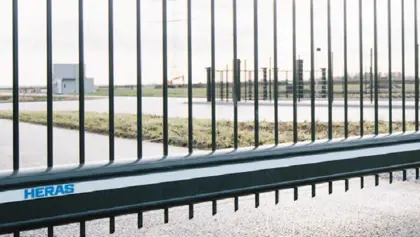Heras: ‘Stay connected with employees who work remotely’
What’s the best way to facilitate a hybrid workplace while ensuring that remote employees stay connected to the company?

'Close connections and staying down to earth’
Heras is a European company specializing in perimeter security. It has 8 offices in 8 countries and around 1,100 employees. Ask Kristel Ignoul, Chief Human Resource Officer at Heras, to describe the company’s culture in a nutshell, and she would say ‘close connections and staying down to earth’. Like countless other companies, the pandemic forced Heras to get on the digital express train; they switched from working at the office to working from home through virtual channels. A lot of time has passed since then. How has digitalization affected their corporate culture? And what about the close connections between employees?
Working remotely via Office 365
When the pandemic broke out, all Heras employees started working from home. Almost overnight, working remotely meant communicating online and discovering and getting to grips with digital channels. Kristel: ‘The first challenge we ran into was the lack of systems to ensure that this process was streamlined.’ Fortunately, a switch to Microsoft Office 365 was already in the works for the Dutch branches, which helped enormously. In addition, all employees received a brand-new laptop.
More than just technology
And yet, explains Kristel, it’s not the technology that keeps the connection strong; it’s what you do with it that counts. ‘Each department figured out its own way of dealing with this. Most of them organized a couple of Teams meetings each week with the whole team, the department and the various sub-teams. This allowed them to keep the lines of communication short and meant they could discuss how things were going and step in where necessary.’
To ensure that employees weren’t overloaded with Teams requests, guidelines were provided for scheduling meetings. Employees’ diaries were sometimes jam-packed with meetings, and they didn’t have enough breaks in between. Thanks to the guidelines, they now have enough space to catch their breath.
As a result, Heras’s digital transformation went smoothly. ‘We were looking for a middle ground that catered to everyone, with a digital and physical workplace. Where necessary, employees could take an office chair and a screen home with them. We also gave them plenty of tips and pointers, for example, on how to set up the height of their desk correctly and how to maintain structure in their working day when working from home.’

‘Schedule 50-minute meetings so that there is enough space between appointments.’
'To ensure that employees weren’t overloaded with Teams requests, we provided guidelines for scheduling meetings. Employees’ diaries were sometimes jam-packed with meetings, and they didn’t have enough breaks in between. Thanks to the guidelines, they now have enough space to catch their breath.'
- Kristel Ignoul, Chief Human Resource Officer at Heras
Impact on employees
Some employees have embraced the change and don’t want to return to the pre-pandemic situation. They feel more productive and see the switch as something positive. Others are taking a little longer to fully adapt to the changes; the company picked up on this and stepped in to help. ‘For instance, managers are helping out by organizing day-start calls and sharing tools to help people organize their work more efficiently.’
'Respecting everyone’s ability to adapt and the pace at which everyone participates in the transition is the key to a successful change.'
From informal to rational
Digital meetings make interactions a lot more rational, says Kristel. ‘Social conversations become shorter, and you get to the point of a meeting much more quickly. Although this makes the workplace more professional, employees miss out on some of the enjoyment at work.’ Those informal chats quickly fall by the wayside, explains Kristel. ‘So then you have to actively work on those social interactions with your employees.’
Heras organized all sorts of things to maintain strong ties. In the UK, a monthly online social activity was organized, such as a quiz or a meeting on a particular theme. In the Netherlands, a bingo night was organized. These kinds of events go a long way to helping employees enjoy their work and to maintaining a strong bond with the company.
Hybrid working: the way to go
Kristel: ‘Nevertheless, working entirely from home for such a long period of time is still a major challenge for many people. Colleagues find it harder to switch off, the line between work and home becomes blurred and there’s a greater disconnect with the company. Or at least, there is if you don’t put in the effort. However, working at the office every day is, unfortunately, not an option due to the pandemic, which means that hybrid working is the future.’
After the pandemic, Heras is ready to tread a new path. A new ‘working from home’ policy has been drawn up, which stipulates that people will return to the office for at least three days a week. The best of both worlds: the right balance between working from home and at the office, face-to-face meetings and professional online meetings and the efficiency of remote working.
